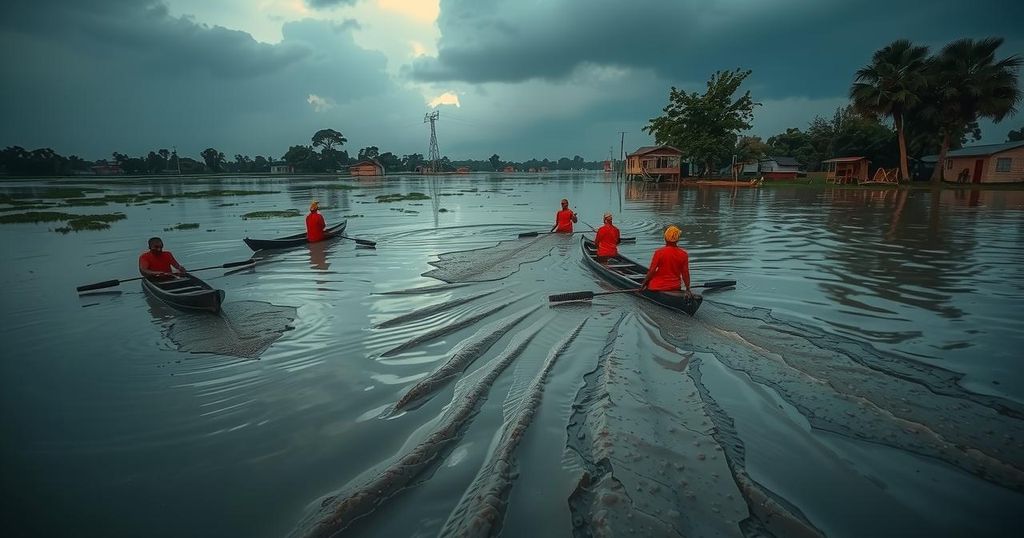Health Crisis Rises as Severe Flooding Hits South Sudan: WHO Mobilizes Response
Severe flooding in South Sudan has led to the displacement of over 226,000 individuals and has substantially damaged health infrastructure, with 58 health facilities submerged and approximately 890,000 people affected. The WHO is responding by distributing emergency health kits and coordinating health responses to combat the deteriorating health conditions, including outbreaks of diseases such as cholera and malaria.
South Sudan is grappling with unprecedented flooding, reportedly the worst in decades, resulting in severe humanitarian crises. Over 226,000 individuals have been displaced, and significant damage has occurred to homes, livelihoods, roads, and key infrastructure, with waterlogged landscapes affecting 42 of the country’s 78 counties. Critical healthcare facilities are in jeopardy, as evidenced by 58 health facilities being submerged and nearly 90 others cut off from access due to the flooding. As a consequence, approximately 890,000 individuals are currently affected by the floods as of early October 2024. While the rainy season typically brings heavy downpours from April to November leading to floods, the severity of this year’s deluge is attributed to climate change, further straining community resilience and leading to permanent displacements. The floods have intensified the ongoing humanitarian situation in South Sudan, which is already hosting close to 800,000 refugees and returnees fleeing conflict in neighboring Sudan. Alarming health risks are apparent, including suspected cases of cholera and a surge in malaria cases, with over 120,000 reported and at least 31 associated deaths recorded as of late September 2024. Additionally, within a short five-week span, 55 incidents of snake bites have been documented. Dr. Humphrey Karamagi, the WHO Representative in South Sudan, emphasized the critical state of vulnerability for the affected populations, stating that “People are in a heightened state of vulnerability due to multiple shocks. WHO is committed to work with the Ministry of Health and our partners to ensure that they have access to essential health services continue while also prioritizing the response to growing humanitarian and health needs.” In response to this emergency, the World Health Organization (WHO) has dispatched approximately 88 metric tonnes of emergency health kits to various locations, including Renk, Bentiu, Malakal, and Bor counties, targeting over 870,000 people. These kits contain vital medical supplies such as emergency health kits, cholera investigation and treatment kits, antimalarial medications, and snake antivenoms. Since the start of 2024, WHO has also distributed nearly 1,300 malaria kits across the nation and has prepositioned cholera diagnostic kits essential for addressing this health crisis. The WHO, in collaboration with the Ministry of Health, is amplifying its response to this multi-faceted health emergency and has undertaken a needs assessment in Cueibet County to chart the way forward. A concerted effort is being made to protect health facilities from further damage whilst ensuring the safe transit of essential medical supplies. Monitoring efforts will continue to focus on the health impact of flooding, particularly concerning vector-borne and water-borne diseases. Furthermore, WHO is coordinating localized emergency health assistance to ensure that necessary support reaches those in utmost need. The WHO is actively supporting the establishment of climate-resilient health systems across the African region, reinforcing that climate change presents substantial threats to public health. This entails constructing robust structures for effective action and employing scientific evidence to formulate strategies for health adaptation and the mitigation of climate effects. Through advocacy for sustainable investments, WHO aims to fortify health infrastructures against climate-related shocks, thereby safeguarding vulnerable communities.
The article addresses the severe flooding situation in South Sudan, exacerbated by climate change and an existing humanitarian crisis due to internal and external conflicts. It highlights the impact of the flooding on displaced populations, health infrastructure, and the emergence of water-borne diseases amid rising health risks. The World Health Organization’s response and support in providing emergency health supplies and coordinating health strategies are emphasized, along with broader efforts to develop climate-resilient health systems in the region.
In summary, South Sudan’s worsening flooding crisis has dramatically impacted public health and the overall humanitarian situation, highlighting the intersection of climate change with health risks. The coordinated efforts by WHO and local health authorities seek to mitigate these impacts while striving to maintain essential health services for vulnerable populations. The ongoing distribution of health supplies and the push for sustainable investments in resilient health systems are crucial as South Sudan navigates the complexities of this multifaceted emergency.
Original Source: www.afro.who.int




Post Comment